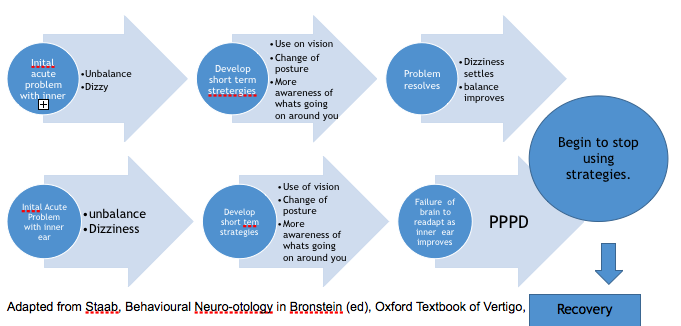What is Persistent Postural-Perceptual Dizziness?
Persistent Postural-Perceptual Dizziness (PPPD) is due to a change in the functioning of the balance (vestibular) system, without necessarily any structural damage. It is very common, and the symptoms include chronic dizziness and unsteadiness that increases with movement or exposure to complex visual stimulus. For example, many people with PPPD struggle with supermarkets, busy streets, and action scenes in movies. These symptoms must have persisted for 3 months or more. Physical examinations, laboratory tests, and neuroimaging may not show any problems and are not used to diagnose PPPD but may help to diagnose any other problems that are contributing to the problem.
Why do I get Persistent Postural-Perceptual Dizziness?
Initially there may have been an acute problem with the inner ear or another medical event which caused dizziness. Your brain tries to adapt and compensate for this dizziness using certain strategies including relying on your vision, using different postures and being vigilant about how you move. When the acute problem improves or resolves your brain should stop using these strategies. In people in PPPD their brains do not stop using these strategies. There are certain factors that mean you are less likely to stop using the acute strategies that your brain has learnt, anxiety is one of these. However, this does not mean it is a psychiatric problem.

What is the treatment for Persistent Postural-Perceptual Dizziness?
There are currently no large studies to show the best treatment for PPPD, but vestibular rehabilitation is usually recommended first. Some smaller studies have shown benefits to patients from anti-depressant medication (selective serotonin reuptake inhibitors) and SNRIs (serotonin norepinephrine reuptake inhibitors). This is due to the effects on the brain, not because people with PPPD are depressed. Counselling and cognitive behaviour therapy in addition to vestibular rehabilitation is also helpful if anxiety or depression is present.
Can Physiotherapy help me manage my Persistent Postural-Perceptual Dizziness?
A physiotherapist who specialises in vestibular rehabilitation will provide advice and education about your condition. They will also use exercises designed to help you become less sensitive to activities that provoke your symptoms. You may be given a programme of exercises to carry out at home.
